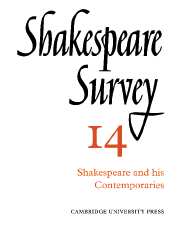Book contents
- Frontmatter
- Studies in Elizabethan and Jacobean Drama since 1900
- Shakespeare and Lyly
- Shakespeare and Mundy
- Marlowe as Provocative Agent in Shakespeare’s Early Plays
- The Tragedy of Revenge in Shakespeare and Webster
- The Simplicity of Thomas Heywood
- The Tragic Vision of Fulke Greville
- Shakespeare v. The Rest: The Old Controversy
- Shakespeare’s Gentleness
- Milton on Shakespeare
- An Unrecorded Elizabethan Performance of Titus Andronicus
- Stratford-upon-Avon a Hundred Years Ago
- International Notes
- Shakespeare Productions in the United Kingdom: 1959
- Three Directors: a Review of Recent Productions
- The Year's Contributions to Shakespearian Study 1 Critical Studies
- 2 Shakespeare’s Life, Times and Stage
- 3 Textual Studies
- Books Received
- Index
- Plate section
The Year's Contributions to Shakespearian Study 1 - Critical Studies
Published online by Cambridge University Press: 28 March 2007
- Frontmatter
- Studies in Elizabethan and Jacobean Drama since 1900
- Shakespeare and Lyly
- Shakespeare and Mundy
- Marlowe as Provocative Agent in Shakespeare’s Early Plays
- The Tragedy of Revenge in Shakespeare and Webster
- The Simplicity of Thomas Heywood
- The Tragic Vision of Fulke Greville
- Shakespeare v. The Rest: The Old Controversy
- Shakespeare’s Gentleness
- Milton on Shakespeare
- An Unrecorded Elizabethan Performance of Titus Andronicus
- Stratford-upon-Avon a Hundred Years Ago
- International Notes
- Shakespeare Productions in the United Kingdom: 1959
- Three Directors: a Review of Recent Productions
- The Year's Contributions to Shakespearian Study 1 Critical Studies
- 2 Shakespeare’s Life, Times and Stage
- 3 Textual Studies
- Books Received
- Index
- Plate section
Summary
‘The work of Shakespeare is like life itself’, T. S. Eliot once wrote, ‘something to be lived through’, and the words are used by Rudolf Germer to introduce his brief account of the significance of Shakespeare in Eliot’s poetry. This influence has been constantly reciprocated, of course, for although Eliot has produced no substantial body of Shakespearian criticism some of his incidental observations, not in themselves original, have achieved a currency akin to the proverbial. One of the most celebrated statements is that upon the essential unity of Shakespeare’s work:
We do not understand Shakespeare from a single reading, and certainly not from a single play. There is a relation between the various plays of Shakespeare, taken in order; and it is a work of years to venture even one individual interpretation of the pattern in Shakespeare’s carpet.
The very ease of the notion, the strong wish that an artistic life as rich, and diverse, as Shakespeare's should be comprehensible as a whole, brings with it all kinds of complexities for criticism. Critical studies which range over the whole field of Shakespeare's work inevitably concentrate, by necessity, upon some essential but single attribute—the development of language, of imagery, of ethical concern; studies devoted to a single play are forced to take stock of so many different factors that a view of the whole is difficult to preserve; and studies of relationships between different plays depend upon certain suppositions of chronology—'taken in order' is an excellent idea; what order?
- Type
- Chapter
- Information
- Shakespeare Survey , pp. 138 - 148Publisher: Cambridge University PressPrint publication year: 1961



